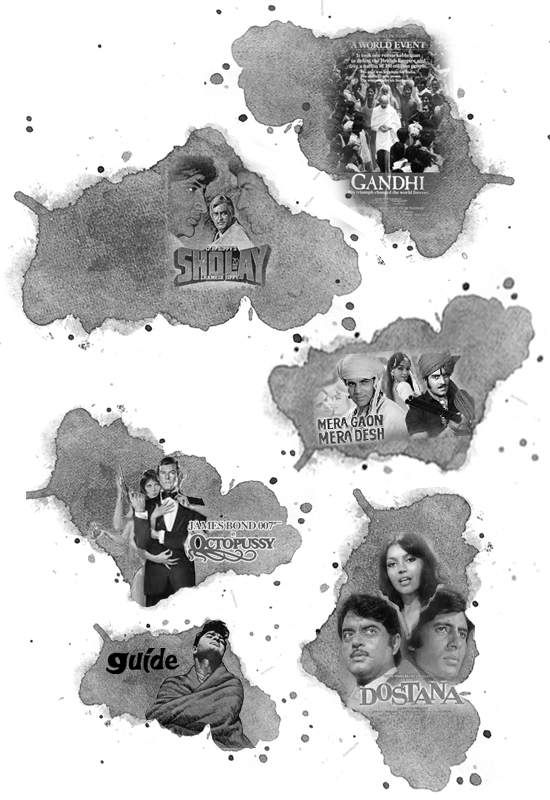

Ram Yedekar
, popularly called Ram Dada was one of the best art directors of his time, of both national and international standards. He has to his credit, classics such as Sholay, Guide, Gandhi, A Passage to India amongst many others.He began his career in early 1960s & worked with all the best talents of the day. Raj Khosla, Ramesh Sippy, Vijay Anand, Yash Johar, Dev Anand, Amitabh Bachchan, Ram Gabale in the Indian film industry and Richard Attenborough, James Ivory, David Lean, Ismail Merchant, John Glen in the international level are just few of the people he has worked with.
His genius was spotted by the British and Americans very early. He worked in "Nine Hours to Rama" & "Maya" in the early 1960s along with Indian movies. He won the Filmfare Best Art Director award for "Son of India" in the year 1963.
Guide, Sholay, Yeh Raaste Pyar Ke, Mera Gaon Mera Desh, Kache Dhaage, Dostana, Main Tulsi Tere Aangan Ki are few of his classics. Gandhi, The Far Pavilions, Heat & Dust, A Passage to India, Octopussy, The Perfect Murder, The Deceivers and many more are to his credit.
For art directors, Sholay is & will always remain a benchmark. Sholay needed a harsh terrain but both Mr. Ramesh Sippy and Mr. Ram Yedekar did not want to shoot in Rajasthan as many dacoit films had been shot there. Ram Dada suggested searching for locales in south India as it had never been done before.
Ms. Anupama Chopra, in her book "Sholay - The Making of a Classic" calls Ram Dada a "pint-sized power house". She mentions how he headed south in his car with just his cook and driver. They searched for almost a month, cooking on the roadside and sleeping in the car.
Ram Yedekar created an entire village Ramgarh in the middle of boulders and open land at Ramanagara near Bengaluru; starting with a road from the highway to actually reach the place. Art directors will realize the sheer magnitude & research involved to create the authentic village set which took almost a year to come up. The jail sequence was set up at Raj Kamal studios Mumbai to match the natural lighting of the location sets. The natural look of the sets, train sequence & locations, specially in the time of no computers and VFX, makes Ram Yedekar’s work a true piece of art.
In 1982, the movie "Gandhi" won the maximum Oscars in the 55th Academy awards; including Art Direction. Ram Yedekar was a major part of the art department.
Mr. Stuart Craig (Head of Art department) personally thanked Ram upon accepting the award. In an interview about locations and sets in "Gandhi", Mr. Stuart Craig stated that "Ram Yedekar was straight from the Bollywood tradition but he was the most terrific man for us".
Guide is a 1965 romantic drama film starring Dev Anand and Waheeda Rehman. The film is based on the novel The Guide, by R. K. Narayan.
The film was a box office hit upon release. The movie proved memorable for its award-winning performances by the lead actors and memorable music by S. D. Burman. Time magazine listed it at Number Four on its list of Best Bollywood Classics
The film was a box office hit upon release. The movie proved memorable for its award-winning performances by the lead actors and memorable music by S. D. Burman. Time magazine listed it at Number Four on its list of Best Bollywood Classics
Mera Gaon Mera Desh is a 1971 Indian film, directed by Raj Khosla, written by Akhtar Romani, Art Direction by Ram Yedekar and starring Dharmendra in the lead role and Vinod Khanna as the villain. The film contains many hit songs. It was a box office success.
Inspite of all his achievements, Ram Yedekar was a very simple, humble man. Deeply interested in varied ancient cultures and philosophy, he collected fables and stories from all over the world. The art department of the Government of Maharashtra contracted him to restore ancient wall paintings in caves near Mumbai. He enjoyed doing it as he felt it was his humble contribution to the great art of our country. His mantra was "Dream big & be ready to work hard for your dreams".
He never allowed success to go to his head & he remained a people’s man - Ram dada/Ram uncle till the end.
Ram Yedekar was Shrikant Desai’s father-in-law. They were less of in-laws and more like father and son. Dada would often regale Shrikant with anecdotes from his movies. They promised each other that they would produce movies some day. Ram dada died on 24th July 2000, but Shrikant Desai kept the dream of movies in his heart. Today we go ahead with Darshan Productions with the confidence of having his love and blessings with us.

